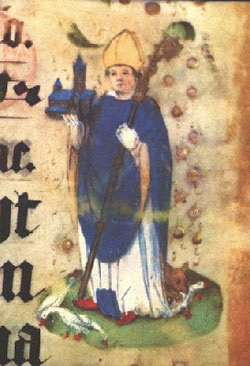
St Ludger's parents, Thiadgrim and Liafburg, were wealthy Christian Frisians of noble descent. In 753 Ludger saw the great Apostle of Germany, Saint Boniface, which, together with the subsequent martyrdom of the saint, made a deep impression on him. At his own request he was sent to the Utrecht Cathedral School (Martinsstift), founded by Saint Gregory of Utrecht in 756 or 757, and made good progress. In 767 Gregory, who did not wish to receive episcopal consecration himself, sent Alubert, who had come from England to assist him in his missionary work, to York to be consecrated bishop. Ludger accompanied him to be ordained into the diaconate (as he duly was, by Ethelbert of York) and to study under Alcuin, but after a year he returned to Utrecht. Some time later he was granted an opportunity to continue his studies in the same school, when he developed a friendship with Alcuin which lasted throughout life. In 785 he met Charlemagne and was given charge of the spiritual direction of five provinces. He refused the see of Trier but became the founding bishop of Munster in 804.
On Passion Sunday 809, Ludger heard Mass at Coesfeld early in the morning and preached, then went to Billerbeck, where at nine o'clock he again preached, and said his last mass. That evening he died peacefully in the company of his followers.
A dispute arose between Münster and Werden for the possession of his body. His brother Hildegrim was appealed to, and after consultation with the Emperor, decided in favour of Werden, where the relics still remain. Portions have however since been brought to Münster and Billerbeck
St. Ludger is represented either as a bishop reciting his breviary or as standing between two geese (occasionally described as swans). His feast day is celebrated on 26 March.




